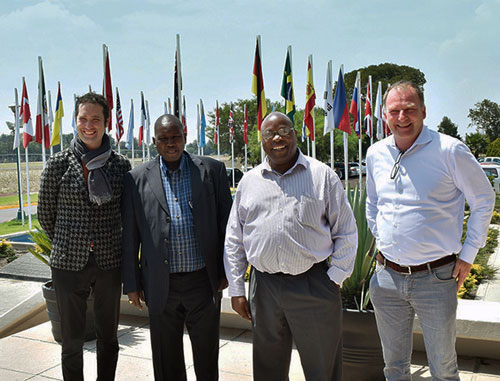
This week, CIMMYT had the honor of hosting Dr. Eliud Kireger, the Acting Director General of the Kenya Agricultural and Livestock Research Organization (KALRO). His visit included travel to the experiment station at Ciudad Obregón for first-hand experience regarding CIMMYT wheat research, as KALRO is one of the few partners in Africa with whom we work on both maize and wheat.
According to Kireger, a burning issue in agriculture today in eastern and southern Africa is “low productivity per unit area. The increase we’ve seen in yields in different countries is largely due to expansion in land area.” He attributed this low productivity per unit area to lack of technologies or knowledge that can boost productivity. This dearth translates itself in many ways, such as low use of fertilizers, improved seed, or mechanization.

Program and leader of MasAgro, Eliud Kireger, Stephen Mugo and Victor Kommerell, Program Manager-WHEAT. Photo: CIMMYT Files
Accompanying Kireger was Stephen Mugo, CIMMYT–Africa Regional Representative who also doubles as country representative for Kenya. Mugo lauded the benefits of the CIMMYT–KARLO synergy. “There is no single institution — working alone — that can be able to address all the challenges facing agriculture,” Mugo said. “From early on, CIMMYT decided that the only way was to team up with national institutions and work together, so that CIMMYT-developed germplasm and technologies reach intended beneficiaries countrywide for the benefit of maize and wheat farmers. CIMMYT and KALRO jointly design common projects on clear and specific areas to improve maize and wheat, then seek funding for these projects to address drought tolerance, crop pests and emerging diseases.”
One such emerging disease is maize lethal necrosis (MLN), which CIMMYT and KALRO are jointly tackling through ultra-modern shared facilities for MLN screening and for doubled haploid technology that both stand on KALRO land.
Read more on the CIMMYT–KALRO collaboration here.
 Capacity development
Capacity development